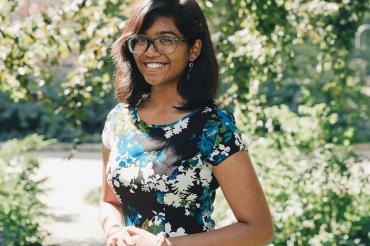#UofTBackToSchool: student's mission of compassion

Published: September 6, 2017
Deborah Emilia Solomon can’t remember exactly how old she was when she saw a documentary about the Africa Mercy, a hospital ship that relies on a crew of volunteers to bring high-quality medical care to people in the poorest regions of Africa. But she vividly recalls the impact the video made on her as a young girl and her determination to join their efforts when she became old enough.
“From the minute I saw that documentary, I knew it was what I wanted to do,” says Solomon, one of 37 young people who have received a Lester B. Pearson International Scholarship – a new awards program created to bring exceptional students from around the world to U of T. “I knew I wanted to help others, and I loved the way the Mercy ship brings medical care to places that can’t access it. It really spoke to me.”
The Mercy Ships organization doesn’t take volunteers younger than 18, so Solomon isn’t eligible yet. But last spring, she sent an email to the program’s administrators anyway. “I would love to be a future volunteer,” she wrote, noting that she would be studying engineering – and hopes to enter the biomedical stream in her third year at U of T. Once she has a year of specialized studies behind her, she figures she’ll be able to help operate biomedical equipment on board. “Please do keep me in mind for perhaps the year 2020–21.”
It was a typical move for Solomon, who applies relentless discipline and determination to everything she takes on. Ask her how she pulled off an average of 98.9 per cent in Grade 12, and she’ll tell you about the schedule she keeps to document how many times she has reviewed material: three check marks indicate exam-readiness.
A quote she has written in her journal reads, “The only failures are those who fail to try.” The author? Alumnus Lester B. Pearson, whom she cites as an inspiration. She can rhyme off a list of Pearson’s accomplishments – from implementing universal medical care to spearheading UN peacekeeping – and says she was “blown away” at being able to meet Pearson family members at a campus event last May. The quote in her journal “serves as a vital reminder for me to press forward, to never hesitate, to venture into the unknown and to never stop trying,” she says.
A native of India, Solomon epitomizes the broad internationalism that the scholarship aims to promote. She has lived in several countries – Singapore, China, India and, most recently, Canada. (Her father’s work as a ship surveyor involves international postings.) “I feel as if I can fit in anywhere,” she says, and notes that one of the reasons she’s especially excited about studying at U of T is the diversity of its students.
The scholarship covers tuition, books, incidentals and residence for four years, and recipients can choose any area of study at U of T. With engineering, Solomon knows she’s selected a field that has traditionally been male-dominated, but she says she no longer sees gender as an issue. At her high school – Corpus Christi Catholic Secondary School in Burlington, Ont. – boys and girls often worked together on math and science problems without any discrimination, she says with a shrug that would likely have impressed Pearson himself. And she’s excited to see that 40 per cent of last year’s incoming class at U of T engineering was female.
She’s already working to improve her odds of success at U of T – this summer, while on a trip back to India, she planned to squeeze in a calculus course to brush up on her math skills before her undergraduate studies formally began this fall. “It’s a good chance to get familiar again with some of the toughest math,” she says.
If – when – she’s accepted for a volunteer stint on the Africa Mercy, the experience of life at sea won’t actually be new for Solomon. When she was a child, her family spent about six months living on board a ship sailing through the Solomon Islands for one of her father’s job postings. “I think part of my interest comes from that experience,” she says. “But what it’s really about is the work that the Mercy ships are doing and the lives that they’re touching.”
Her family has a tradition of helping others: her uncle and several other family members have worked to help deliver free health care to low-income people in India, and she loves the idea of carrying on the legacy. “I really hope that I can devote more of my life to the service of others,” she says. She looks thoughtful as she says this, and then her mind turns to the Mercy ships again. “I have to send more emails,” she says.
This article originally appeared in U of T Magazine.



